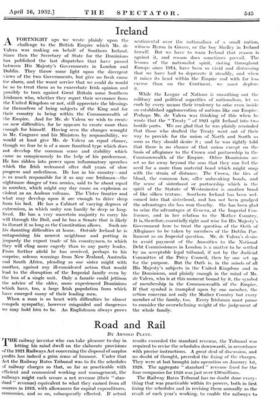Ireland
AFORTNIGHT ago we wrote plainly upon the challenge to the British Empire which Mr. de Valera was making on behalf of Southern Ireland. Since then the Secretary of State for the Dominions has published the last dispatches that have passed between His Majesty's Governments in London and Dublin. They throw some light upon the divergent views of the two Governments, but give no fresh cause for alarm, and the worst -service that we could do would be so to treat them as to exacerbate Irish opinion and possibly to turn against Great Britain some Southern Irishmen who, whether they regret their severance from the United -Kingdom or not, still appreciate the blessings for themselves of being subjects of the King and for their country in being within the Commonwealth of the Empire. And for Mr. de Valera we wish to create no new difficulties, for he appears to create more than enough for himself. Having seen the changes wrought in Mr. Cosgrave and his Ministers by responsibility, we would at least give Mr. de Valera an equal chance, though we fear he is of a more fanatical type which does not develop the common sense and stability which came so conspicuously to the help of his predecessor. He has ridden into power upon inflammatory speeches which the Irish welcomed after dull years of slow progress and orderliness. He has in his country—and is as much responsible for it as any one Irishman—the nightmare danger of two armies, said to be about equal in number, which might any day cause an explosion as violent as an Andean volcano. The Ulster frontier and what may develop upon it are enough to drive sleep from his bed. He has a Cabinet of varying degrees of extremism, in which unity can hardly be deep or long- lived. He has a very uncertain majority to carry his will through the Dail, and he has a Senate that is likely to thwart it so long as the Constitution allows. Such arc his daunting difficulties at home. Outside Ireland he is antagonizing his nearest neighbour and putting in jeopardy the export trade of his countrymen, to which they will cling more eagerly than to any party leader. From further afield he has received, perhaps to his surprise, solemn warnings from New Zealand, Australia and South Africa, pleading as one sister might with another, against any ill-considered action that would lead to the disruption of the Imperial family even by the loss of a single unit. Only a fanatic could jettison the advice of the older, more experienced Dominions which have, too, a large Irish population from which have emerged Many of their leading men.
When a man is so beset with difficulties he almost compels sympathy, however misguided and dangerous we may hold him to be. An Englishman always grows sentimental over the nationalism of a small nation, witness Byron in Greece, or the boy Shelley in Ireland herself. But we have to warn Ireland that reason is against it, and reason does sometimes prevail. The lessons of the nationalist spirit, rioting throughout Europe since 1914, have been so vivid and distressing that we have had to deprecate it steadily, and when it raises its head within the Empire and with far less excuse than on the Continent, we must deplore it.
While the League of Nations is smoothing out the military and political asperities of nationalism, let us curb by every means their tendency to arise even- inside an established agglomeration of nations like our Empire. Perhaps Mr. de Valera was thinking of this when be wrote that the " Treaty " of 1921 split Ireland into two hostile parts. We are glad that he was plainly reminded that those who drafted the Treaty went out of their way to provide for the union of North and South so soon as they should desire it ; and he was rightly told that there is no chance of that union except on the basis of allegiance to the Crown and partnership in the Commonwealth of the Empire. Other Dominions are set so far away beyond the seas that they can feel the need for a more than material bond which might snap with the strain of distance. The Crown, the ties of blood, the common law, offer unbreaking bonds, and the sense of sisterhood or partnership Nvhich is the spirit of the Statute of Westminster is another bond of like silken texture. Southern Ireland has been wel- comed into that sisterhood, and has not been grudged the advantages she has won thereby. She has been glad to seize the advantages at Geneva, at the Imperial Con- ference, and in her relation to the Mother Country. It is, therefore, essentially right and wise for His Majesty's Government here to treat the question of the Oath of Allegiance to be taken by members of the Dublin Par- liament as an Imperial question. Mr. de Valera's desire to avoid payment of the Annuities to the National Debt Commissioners in London is it matter to be settled by an acceptable legal tribunal, if not by the Judicial Committee of the Privy Council, then by one set up for the purpose. But the Oath is, in the minds of all His Majesty's subjects in the United Kingdom and in the Dominions, and plainly enough in the mind of Mr. de Valera, who is at this moment bound by it, the symbol of membership in the Commonwealth of the Empire. If that symbol is trampled upon by one member, the action concerns not only the Mother Country but every member of the family, too. Every Irishman must pause to consider the overwhelming weight of the judgement of the whole family.








































 Previous page
Previous page